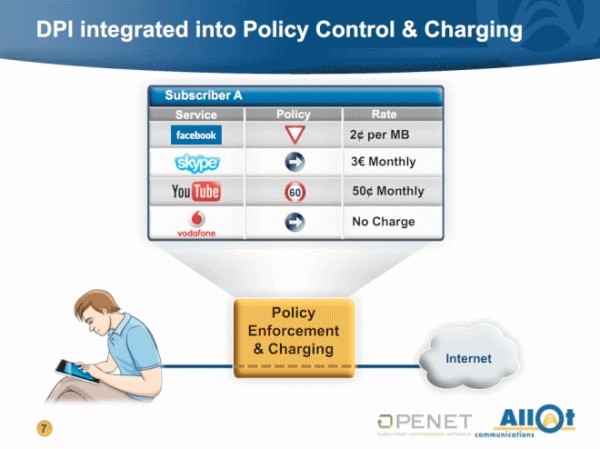This news is very devastating considering wireless companies are openly considering charging fees for people to use different websites. This would mean that only large companies would favored, and it would cost more to use other websites that are smaller and ran by other people. If this were to be put into affect, the Internet would turn into something more like cable, where you get your set amount of channels, and then you would have to pay more to access the less popular channels. I affect, that would destroy the internet as it is, as the Internet would no longer be free, and a majority of websites would become inaccessible if you could not be asked to pay the extra fee to access certain websites.
Just thought that I'd post this, and let everyone become aware of this potential danger.
Just thought that I'd post this, and let everyone become aware of this potential danger.

That slide above is no joke -- it comes from a marketing webinar put on by two companies that count Verizon, AT&T and Vodafone as clients, and it describes a system that identifies customer internet activity and charges a different rate for using Facebook than watching YouTube, while allowing access to Vodafone services for free. Yes, that's basically the nightmare scenario for net neutrality advocates. The two companies behind the slide are Allot Communications and Openet, which sell subscriber-management tools to carriers around the world -- tools that Allot's director of marketing says can scan even encrypted packets to determine what service customers are using and charge accordingly. We're not making this up -- here's the direct quote from the webinar:
Yeah, that's not how anyone actually wants the internet to work -- except carriers, who've been saying increasingly insane things about charging even smartphone manufacturers for customer data usage lately. What's more, it's rumored that the FCC will cave to Verizon and AT&T and exempt wireless internet service from major parts of net neutrality regulation it's expected to pass next week, so this nonsense could very well hit the US sooner rather than later. We'll be keeping a close eye on things -- we'll let you know. Meanwhile, listen to the webinar yourself immediately below.[We use] a number of different methods to accurately identify the application -- methods like heuristic analysis, behavioral and historical analysis, deep packet inspection, and a number of other techniques. What's key is that we have the best application identification available on the market, which means that even applications that are encrypted or use other methods to evade detection will be correctly identified and classified... We essentially feed this real-time information about traffic and application usage into the policy and charging system. Each subscriber has a particular service plan that they sign up for, and they're as generic or as personalized as the operator wants.
You must be registered for see links

